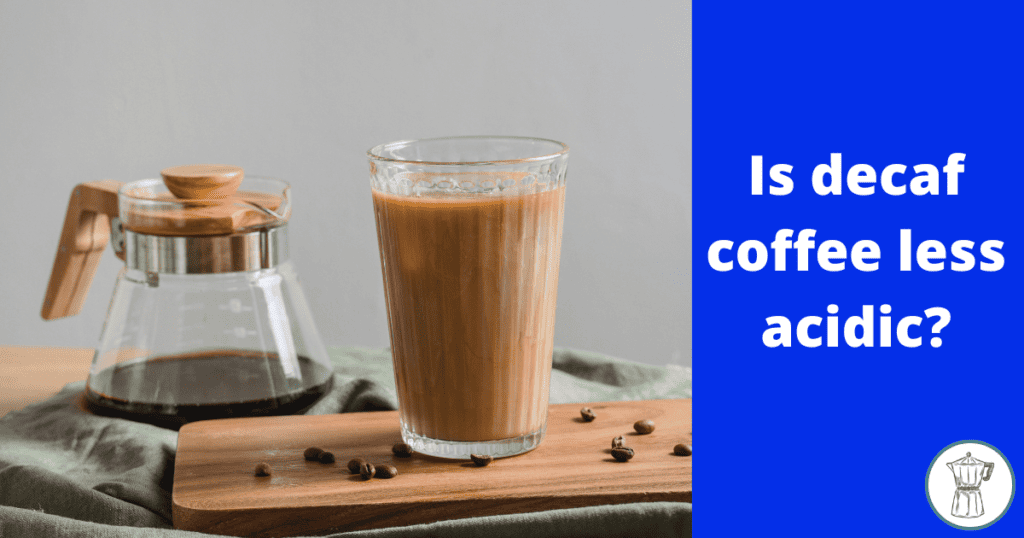Is decaf coffee less acidic than regular coffee?
It’s well-known information that decaf coffee has way less caffeine than regular coffee. But does the acidity level of these coffees different? Stick around, in this article I’m going over the acidity level of decaf and regular coffee and I share a bunch of brewing tips and tricks along the way.
Let’s jump straight into it.
Is decaf coffee less acidic than regular coffee?
The difference between the in terms of their acidity level is minor. Although decaf coffee contains less caffeine (an 8oz cup of decaf has 5mg while the same amount of regular coffee contains 95-200mg) the pH level of decaf is 4.7 whereas the regular coffee has 5 pH.
What is acidity in coffee?
First off, let’s chat about acidity in coffee to help you get the big picture.
Much like other drinks, coffee contains acidity which is a sharp taste and what really makes coffee sour. The more sour your coffee is, the more acidity your coffee contains.
What does affect acidity in coffee?
The amount of acidity in your coffee heavily depends on the coffee beans you use for brewing. For example, light roast coffee beans have more acidity compared to medium and dark. As you might have already guessed, the longer coffee beans are roasted, the less acidity they contain. If you want to avoid acidic coffee, opt for dark roast coffee beans which brew excellent coffee.
Similarly, Robusta coffee beans are higher in acidity level than Arabica as it takes them longer to grow and mature. Typically, Robusta coffee beans grow in higher altitudes and this makes them grow slower, meaning that they contain more caffeine and acidity.
Does decaf coffee contain acidity?
The short is: Yes
Decaf coffee goes through a process of decaffeination where almost all of the caffeine amount is removed, making it an ideal brew for those who get nervous or anxious when having too much coffee during the day. But during decaffeination, the acidity level of coffee remains almost the same. In plain English, decaf coffee contains acidity.
But do all decaf coffees contain the same acidity level?
Not really, as mentioned above, the acidity level is dependent on the roast type and the coffee type. So, light roast decaf coffee is higher in acidity than dark roast decaf coffee.
The effect of acidic coffee on your teeth
Similar to other acidic drinks like orange juice, Coca Cola and red wine, coffee is acidic, meaning that it causes damage to your teeth over time. More specifically, it damages the enamel of your teeth. This can make your teeth thinner, causing you pain when you have cold or hot foods or drinks.
Does decaf coffee damage your teeth as well?
Yes, it does as it contains almost the same level of acidity. A simple way of tackling this issue is to brush your teeth after having your coffee. And if this isn’t possible to do when you have coffee at a coffee shop, brush them when you have coffee at home.
Is decaf coffee easier on the stomach?
You can’t really tell…
Coffee is easier on the stomach depending on many different factors and although decaf coffee is slightly less acidic than regular coffee, it’s not wise to have too many cups every day when you suffer from acid reflux or IMB. It’s key to drink coffee in moderation, especially if you suffer from stomach issues.
If you see that your stomach issues persist, I suggest you give coffee (both decaf and regular) a break for some time, until you see that your issues are completely gone.
Health benefits of coffee
Does coffee have any health benefits? If so, what are they?
Regular
Here are the main health benefits of regular coffee:
- It has antioxidant properties, cleaning your body
- It gives you an energy boost
- It protects you against Type 2 diabetes
- It controls Parkinson’s disease symptoms
- It promotes heart health
- It improves overall health
Decaf
Here are the main health benefits of decaf coffee:
- A great option for those suffering from stomach issues
- Much like regular coffee it has antioxidant properties
- Helps with sleep and overall health and it doesn’t cause anxiety and nervousness
- All the health benefits mentioned in the Regular coffee section
Low acidity alternatives
A great low-acidity alternative is Cold Brew.
Let me explain:
Let’s face it, it takes long to make Cold Brew (about 12 hours), but because the process is long the coffee beans release much of the acidity, making Cold Brew a refreshing low-acidity drink.
How to make it?
Soak 83g of coffee (either coffee beans or ground coffee) in 1lt of cold coffee and leave it for 12 hours. You’ll see that coffee flavours and aromas have mixed up with water creating a great drink to have, especially on a boiling hot day.
Let’s wrap it up
That’s a wrap. Still wondering whether is decaf coffee less acidic than regular coffee? I hope you learned a thing or 2 about the subject and next time you’ll be able to choose decaf or regular coffee based on the caffeine and acidity level. Stay tuned, I’m going to write more articles about coffee, acidity, and brewing tips.
FAQ
Let’s go over a couple of FAQs to help you get a better understanding of the topic.
Is decaf coffee OK for acid reflux?
If you’re suffering from acid reflux or any other stomach issues, I suggest you give coffee both regular and decaf a break. They contain almost the same level of acidity, meaning that even if you switch to decaf coffee, the odds are that you’ll still have stomach issues.
Which coffee is the least acidic?
Coffee with the least level of acidity is dark roast as coffee loses acidity during the roasting; the longer coffee beans are roasted the less acidity they contain. Arabica coffee beans contain less acidity than Robusta, so if you really want to brew coffee that has lower acidity than the average, go for Arabica dark roast coffee beans.

- How to Remove Coffee Stains From Countertop The Easy Way - December 21, 2023
- Can You Reuse Coffee Grounds in French Press? Truth Inside - December 12, 2023
- Can Expired Coffee Creamer Make You Sick? 3 Ways to Find Out - December 9, 2023
